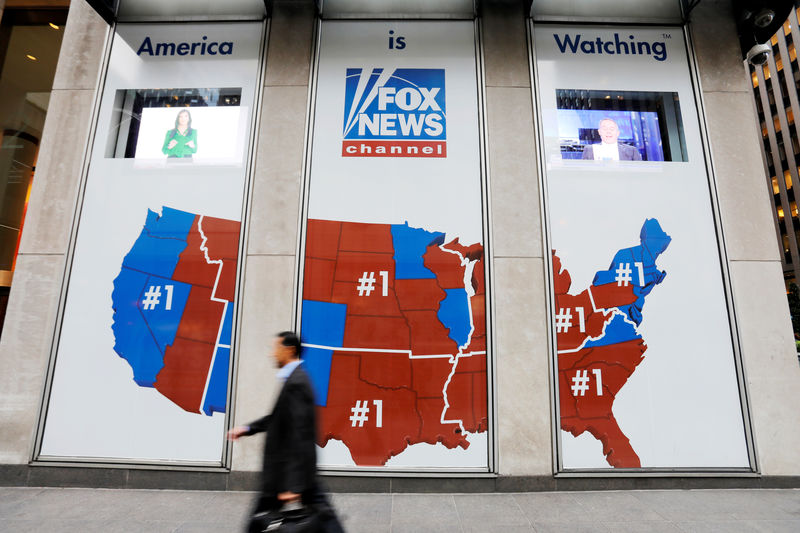By Howard Schneider
WASHINGTON (Reuters) - The performance of the U.S. economy has been a solid clue to the outcome of past presidential elections.
The upcoming campaign may be different, according to results of a new "big data" survey of consumers showing that views about the economy have split along partisan lines, associated with whether an individual approves or disapproves of President Donald Trump, watches Fox News or MSNBC, or identifies as conservative or liberal.
The online poll, by data firm Morning Consult, asks the same five core questions as the University of Michigan's well-known consumer sentiment survey, and for nearly two years has been collecting about 210,000 responses a month, compared to 500 or so each month for the Michigan survey.
It also includes questions about the respondents' political leanings, and an initial set of results released Wednesday showed a stark division that may make it hard to interpret how the economy's performance will play out in 2020 presidential voting.
American voters face the same set of economic facts, from low unemployment to the risks from a trade war, but the survey's index of overall sentiment - at 108 just above the 100 line that separates positive from negative impressions of the economic outlook - masked the huge divide between those who approve of Trump, whose views measured a far rosier 136, and those who disapprove of the president, with a reading of 88.
The results, weighted by factors like age, race and sex, to be nationally representative, were similarly skewed based on media consumption. Viewers of conservative-leaning Fox News registered 139 for current sentiment about the economy; viewers of MSNBC, an outlet often critical of Trump, registered 89. Readers of the New York Times sat in the middle at 107, near those who get their news from Facebook (NASDAQ:FB) (110) and Twitter (112).
The survey will be ongoing, and Morning Consult analyst John Leer said the questions on political alignment, Trump approval and media diet, were included as part of an effort by economists and analysts to try to better define how opinions are shaped and how they influence behavior.
Some election models have already given Trump the edge based on the "record low unemployment rate, subdued inflation and only moderately cooler wage growth," expected next year, Oxford Economics economists Gregory Daco and James Watson wrote in a recent note anticipating a Trump victory.
While such factors have been good predictors of electoral results in the past, "it's important to distinguish the underlying economic phenomenon from political bias," Leer said, noting what he called the "potentially recursive relationship between consumer confidence and news consumption habits."
Consumer poll results: https://fingfx.thomsonreuters.com/gfx/editorcharts/USA-FED-CONSUMER-POLL/0H001QXEP922/index.html
GAME CHANGER
A survey like Morning Consult's doesn't establish causality - whether people feel a certain way about the economy because of the news they consume, for example, or choose their news sources based on their political stance - but it does lay the groundwork to start teasing those relationships out.
That may be particularly important in the age of Trump, who, according to several separate studies, seems to have changed the game when it comes to partisanship influencing views about the economy.
The Michigan survey itself has on occasion included questions about political party affiliation, notably before and after the elections of Ronald Reagan in 1980, Barack Obama in 2008, and Trump in 2016.
Each time there were changes in economic expectations based on party alignment, with members of the winning party showing more faith in the economy, and members of the losing party reflecting less favorable sentiment. For Reagan and Obama, however, the shifts were statistically insignificant; after Trump there was a "dramatic" 74.6 point swing between Democrats and Republicans, according to Michigan survey director Richard Curtin.
And it has persisted.
"Ever since Trump was elected...Republicans have consistently anticipated a robust growth and Democrats have consistently anticipated a recession," Curtin wrote in a research note early in October.
In the past, he noted, high and rising consumer sentiment has favored the reelection of incumbents, with troughs in the outlook favoring challengers.
But "the intense partisanship that now prevails may upend traditional relationships," he wrote.
FED'S DILEMMA
It's not just political analysts who need to worry about the changing dynamic between partisanship and sentiment and how that might play out in the real economy.
Surveys of consumer sentiment and expectations are used to help gauge future economic conditions, and the U.S. Federal Reserve in particular relies on them to assess how consumer spending may hold up, how inflation may behave, and whether people are losing or gaining confidence in the future.
If opinions about the economy have become hardwired based on ideology, rather than economic developments, it could pose a problem for that sort of analysis.
It's possible, Leer suggested, that positive sentiment will still lead consumers to spend as if the future's bright.
"If consumers feel optimistic, they'll continue to support the economy," regardless of why they feel that way, he wrote in an email.
Some research has suggested otherwise.
A 2017 study that included Princeton University's Atif Mian and the University of Chicago's Amir Sufi also noted an "unprecedented" partisan swing in economic sentiment after Trump's election, six times larger than what followed Republican George W. Bush's election in 2000, for example.
Yet they found no change in spending in counties that voted heavily for Trump.
"Despite the substantial rise in economic expectations among those most likely to support Donald Trump since November 2016, we are unable to detect higher actual spending among this group after the election," they wrote. "Partisan bias is exerting a stronger influence on economic expectations over time, but shifts in economic expectations driven by partisan bias do not appear to affect household spending."
